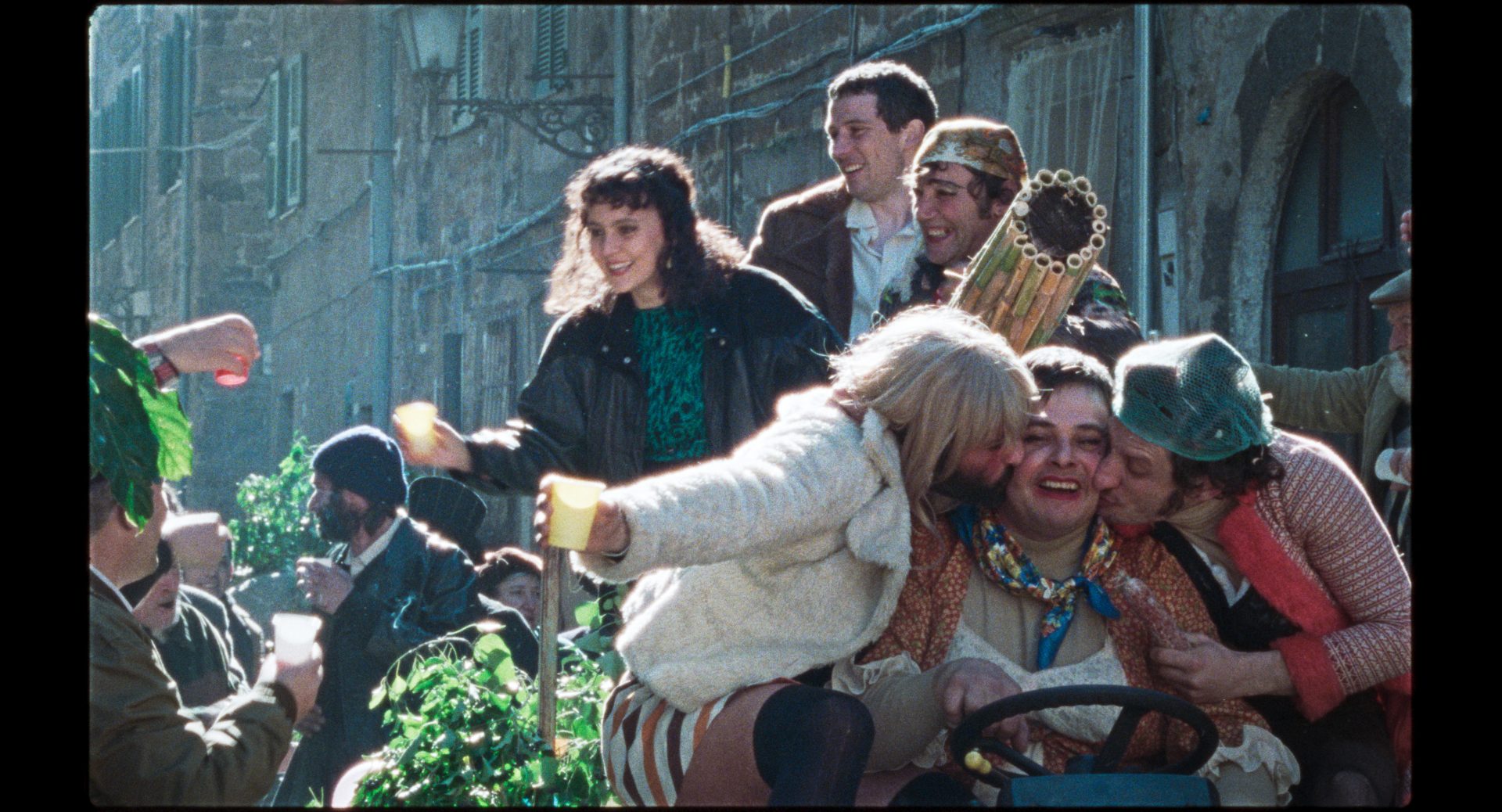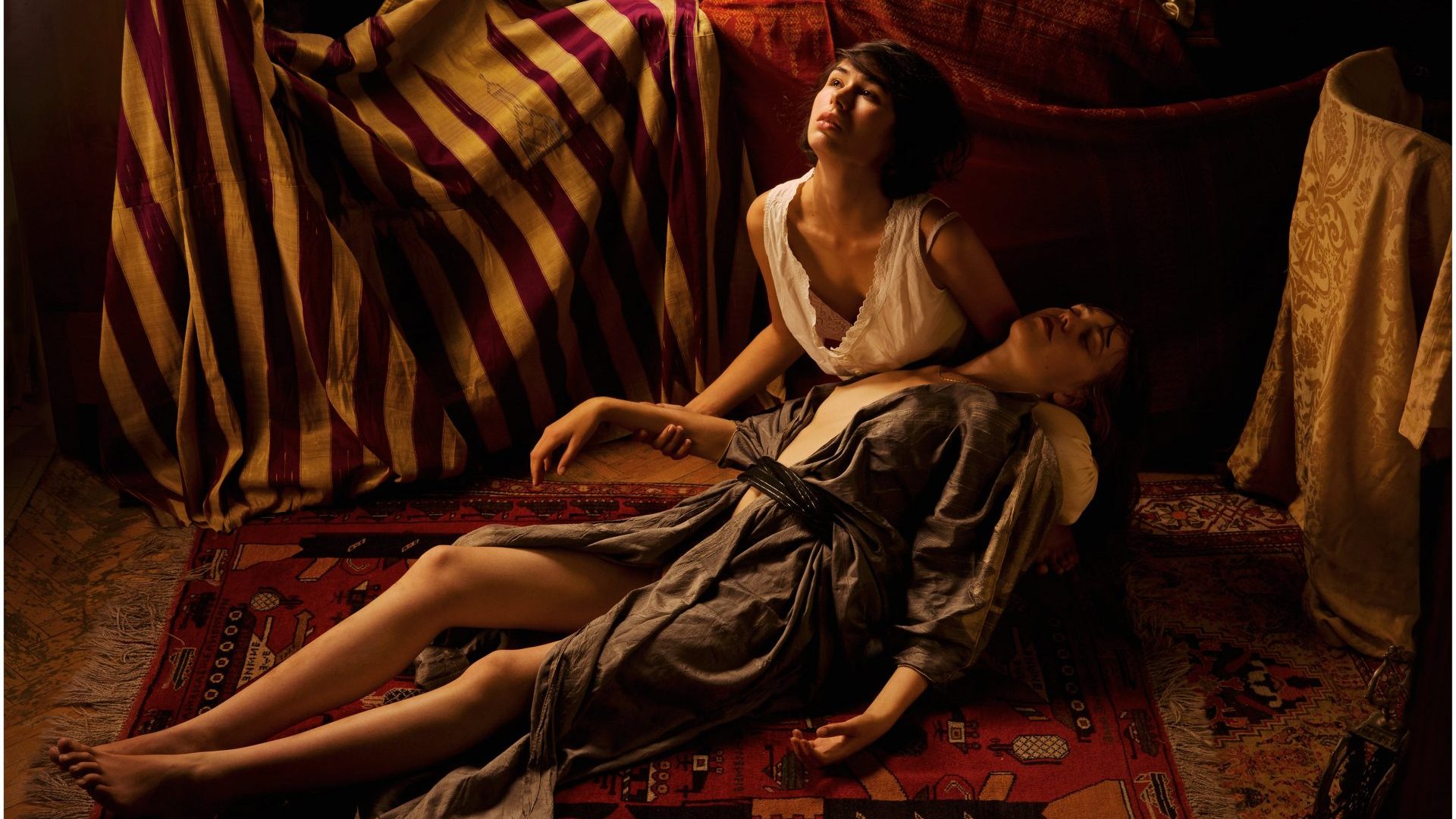Director Alice Rohrwacher starts with a “Sorry for my English”.
I don’t know why she feels the need to apologise. My Italian is also not so good. Thankfully, eventually, an interpreter pops up in the third square of our Zoom. Alice thinks we would have muddled through anyway – I’d have missed quite a bit of detail, though.
“Very beautiful things can happen when you don’t speak the same language,” she says. “You find a special way to communicate, something you both understand, a bit of one, a bit of the other, and it makes life very creative because the brain is working to find a way.”
Alice – it’s pronounced the Italian way, Alee-che – has a wonderfully alluring and disarming way of expressing herself, in conversation and on screen. Her latest film is La chimera, a tumble of 1980s-set Tuscan eccentricity, beauty and antiquity, somewhat weirdly starring Italian cinema’s current favourite Brit, Josh O’Connor.
While Josh has been playing mixed doubles with Zendaya (and Mike Faist) in Luca Guadagnino’s sexy tennis film Challengers, Rohrwacher has become the darling of the international art house circuit, suddenly garlanded with warm praise from big names including Martin Scorsese, Sofia Coppola and Greta Gerwig. How does she feel about these public declarations of grand film-maker love for her?
“Oh, I love them too!” she squeals. “So it’s an incredible coincidence. You feel so happy when you love someone and they love you back, no?”
But she’s quick to move into a more serious and spiritual point about it. “I think we are in a moment where we’re all aware of the fragility of cinema. And now it is becoming more important than ever to sustain the force of a free cinema, a cinema that seeks, not just a cinema that finds… and these directors understand that, so that is what connects us.”
La chimera was a critical hit at Cannes last year, where the world’s film-makers are gathering once again, and where Gerwig finds herself head of the jury thanks to Barbie (which the indie film community sees as some kind of triumph over the mainstream and over the corporations).
It’s a shame Rohrwacher isn’t in contention this year, although she’s much happier that her film is now coming out around Europe for audiences to see and grapple with. It’s a hidden gem of a film about buried treasure that buries its own secrets and gems deep inside.
With echoes of Pasolini and Fellini but with a character all of its own (and talking to Alice, you get a feel for where that character comes from, how a great director’s personality really does end up on the screen), La chimera features O’Connor as a dishevelled, linen-suited treasure diviner, living in a shack on the edge of a hill town, and hanging out with a troupe of tombaroli, a sort of lovable mix of travelling players and grave robbers who roam the countryside digging for Etruscan (the civilisation stretching from 800-400 BC) relics which they flog on to the growing black market.
Meanwhile, O’Connor’s character, Arthur, is a once respectable British archaeologist now totally immersed in his own depression and grief while in search of something too, a lost love called Beniamina, the daughter of an aristocratic family who all live in a crumbling villa and where the matriarch is played with languorous majesty by Isabella Rossellini.
What a truly unusual set-up it all is, but how quickly we get to understand this world, of processions through cobbled streets and drinking around campfires (I was reminded of the old “oompah” cinema of Emir Kusturica) and the ecstatic sensuality in how Arthur makes his discoveries, using a divining rod to practically commune with the past, with what lies beneath this ancient Italian earth, the echoes of past, collapsed civilisations.
If you’ve seen Rohrwacher’s previous films such as the rural family idyll of The Wonders (2014) and the mystical, modern Christ fable Happy as Lazzaro (2018), you’ll get the poetry of her approach, the strangeness which feels like anything could happen next.
She actually speaks about her work the same way, with a big smile on her face, a beam that shines out even through Zoom. Does she write these scenes down?
“I need a script, yes, to get financing and to explain the concept to people but it is not a deaf script, it’s one that listens, hears what is happening during shooting – I like to show the reality of what is happening while we are all there pretending.”
She launches into a story about some birds flying into shot and her keeping the camera on them because the bird was very symbolic to ancient Etruscan culture. She tells it with such infectious enthusiasm and Italian colour. And then she’s back to scripts which, she says, “establish the rules of the game, like when you’re a child, and you need the rules but then someone breaks them, or cheats and it all changes but you play along with it…”
And then she’s off again talking about how her scripts are there as a safety net. “But what I really tell is the story of what happened when we try to tell that story, when we make the film. The script is there to protect the acrobat, so the acrobat can feel free to fall.”
Sorry, who’s the acrobat, I ask? “Oh we all are,” she rejoices. “Oh, no, maybe, it’s the image that is the acrobat, yes, the movement of the camera, the cinema itself, that’s the acrobat.”
Alice is talking to me from what looks like a farmhouse kitchen, with old beams and jars of olive oil on the shelf, and a huge if ancient-looking fridge behind her. “I’m in Umbria where I live, but not exactly where I live because now I’m in a house in Orvieto because the wifi is much better here…”
Rohrwacher’s hair is tumbling, which matches her words and her films. She makes me smile.
Gerwig said La chimera left her “euphorically happy”, and for all the sexy starriness of making Challengers, O’Connor has spoken of how he lived in his camper van while making La chimera, deep in the Umbrian and Tuscan countryside, often without plumbing and electricity, a bit like his character Arthur’s makeshift shack.
“Oh, Josh is an astronaut,” trills Alice. Not an acrobat, then? She laughs. “Also an astronaut. He comes like a big gift, he is timeless, one of the most extraordinary people I’ve ever met. You know, he wrote me a letter just to say how he loved my previous film Happy as Lazzaro. A letter. That is so beautiful.”
The pair met up and visited the Museo di Villa Giulia in Rome. She asks me if I know it and I must look a bit obviously regretful that I don’t. “Oh, you must visit, it’s a wonderful place, the best collection of Etruscan treasures in the world.”
I visit the website straight after and picture Alice and Josh wandering about, finding their way among the fragments of the past, the reliefs and the statues in bits, and the broken pots with their broken English and Italian and ending up putting together this weird and wonderful film.
“Film is like a mosaic yes,” Alice enthuses. “We make a film and we leave behind a treasure we hope others will discover. I hope film can last so long.
“But this kind of cinema is a language that Josh and me, we found our language and it was away from the clear dogmas of narration that are taught to AI screenplays. We wanted to do something that you can make on a computer, so to make a film free from these dogmas is an act of rebellion.”
One feels the ancient Etruscans would approve.
La Chimera is in UK cinemas from May 10 and on Curzon Home Cinema
Five Cannes picks
BIRD (director Andrea Arnold)
The Fish Tank film-maker’s career has been championed by the festival since her feature debut Red Road (which is itself receiving a special retrospective showing) and she returns to the competition with top European talents such as Ireland’s Barry Keoghan and Germany’s Franz Rogowski. Bird is about a 12-year-old girl called Bailey living in a squat in north Kent, so expect some hard-scrabble realism tinged with moments of ecstasy and beauty.
KINDS OF KINDNESS (Yorgos Lanthimos)
A quick follow-up to awards darling Poor Things, the Greek director re-teams with his Dogtooth and The Lobster writer so we expect a darker surrealism in an American-set movie starring Emma Stone (another re-teaming), Willem Dafoe and Jesse Plemons among others, all playing different roles in three interlocking stories. Yes, it will be weird.
OH CANADA (Paul Schrader)
You never quite know what this legendary screenwriter (Taxi Driver won the Palme d’Or in 1976) will deliver as director, but here he’s directing his American Gigolo star Richard Gere in a story about a tormented writer looking back on his life as a draft-dodger. Saltburn’s Jacob Elordi co-stars as the younger Gere, with Uma Thurman and White Lotus 2’s Michael Imperioli among the cast.
EMILIA PÉREZ (Jacques Audiard)
My hottest Cannes ticket is always an Audiard: he won top prize here for Dheepan in 2015, although the impact of 2009’s A Prophet was unforgettable. Ever inventive and risky, he’s back with a Mexican drugs cartel musical starring Zoe Saldaña, Selena Gomez and Édgar Ramírez – which means we have no idea what he might deliver, but there will be no shortage of style and cinematic cool, all with a crazy edge. I hope.
PARTHENOPE (Paolo Sorrentino)
After the seductive Neapolitan memoir of The Hand of God, Sorrentino reeled in Gary Oldman for his next ode, another shimmering tribute to his Mediterranean birthplace, the beauty of Capri and the allure of its women. Billed as a “feminine epic” and a “deeply romantic story”, expect a cast of beautiful and eccentric characters and spectacular images of sea and sunshine.




